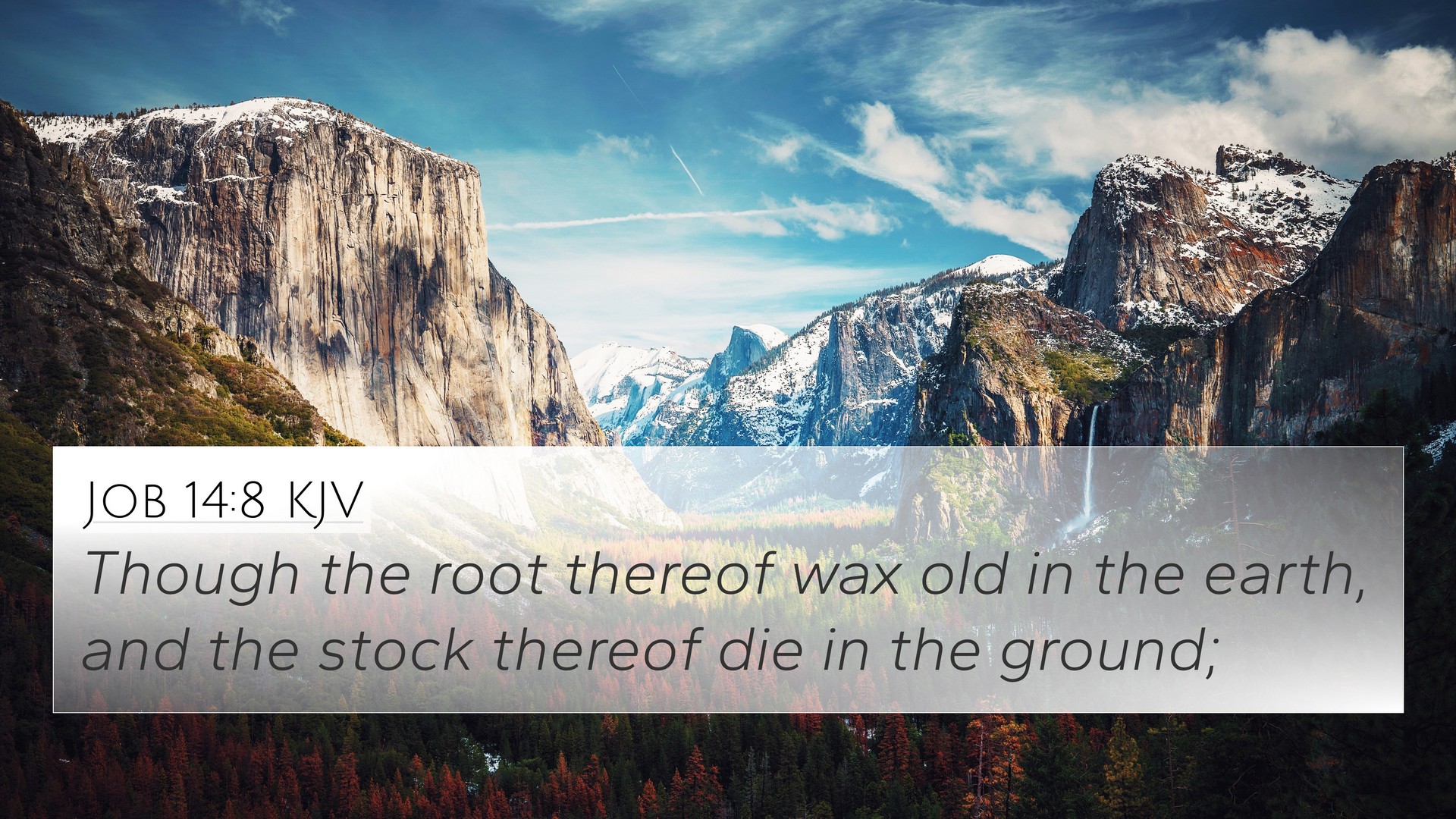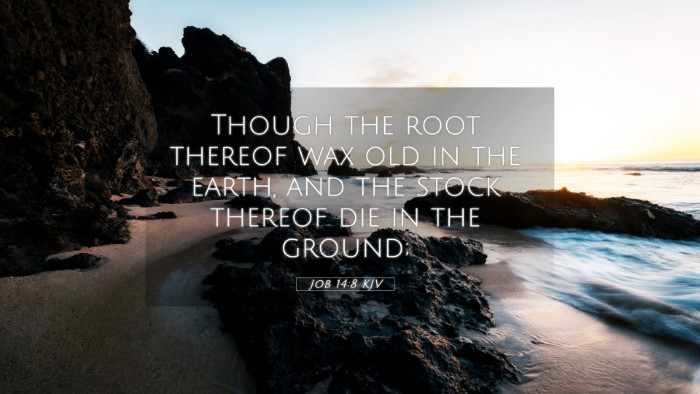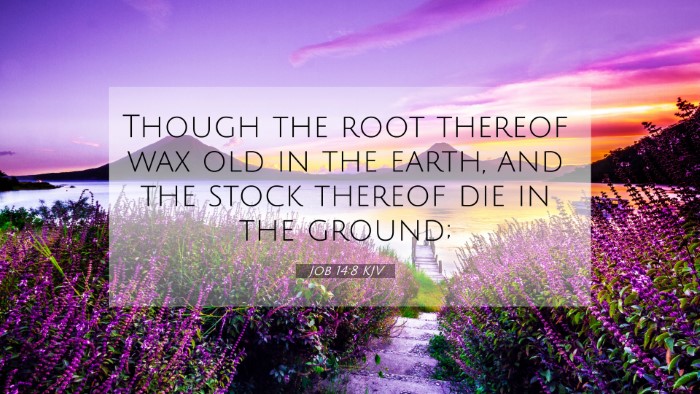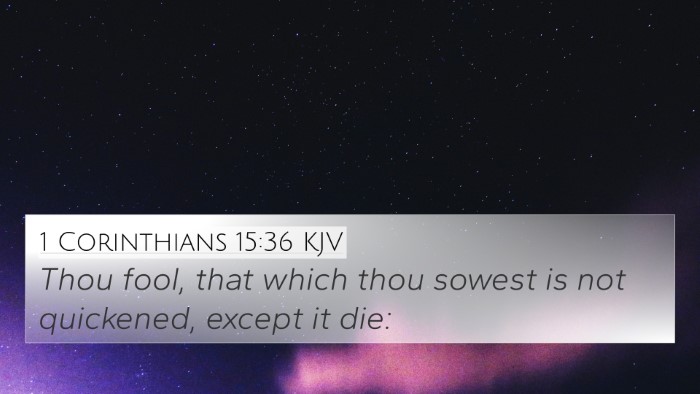Old Testament
Genesis Exodus Leviticus Numbers Deuteronomy Joshua Judges Ruth 1 Samuel 2 Samuel 1 Kings 2 Kings 1 Chronicles 2 Chronicles Ezra Nehemiah Esther Job Psalms Proverbs Ecclesiastes Song of Solomon Isaiah Jeremiah Lamentations Ezekiel Daniel Hosea Joel Amos Obadiah Jonah Micah Nahum Habakkuk Zephaniah Haggai Zechariah MalachiJob 14:8 Similar Verses
Job 14:8 Cross References
Though the root thereof wax old in the earth, and the stock thereof die in the ground;
Uncover the Rich Themes and Topics of This Bible Verse
Listed below are the Bible themes associated with Job 14:8. We invite you to explore each theme to gain deeper insights into the Scriptures.
Job 14:8 Cross Reference Verses
This section features a detailed cross-reference designed to enrich your understanding of the Scriptures. Below, you will find carefully selected verses that echo the themes and teachings related to Job 14:8 KJV. Click on any image to explore detailed analyses of related Bible verses and uncover deeper theological insights.
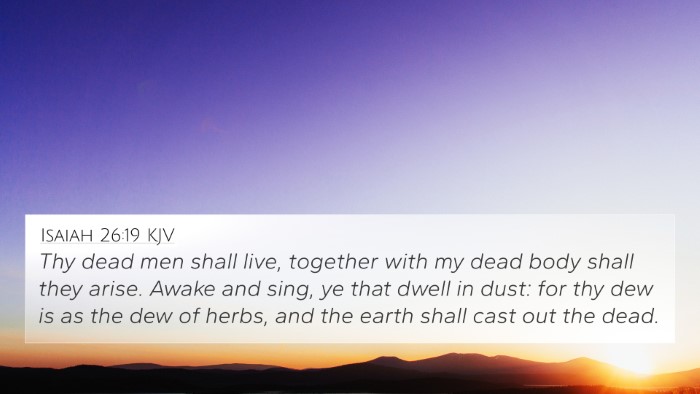
Isaiah 26:19 (KJV) »
Thy dead men shall live, together with my dead body shall they arise. Awake and sing, ye that dwell in dust: for thy dew is as the dew of herbs, and the earth shall cast out the dead.
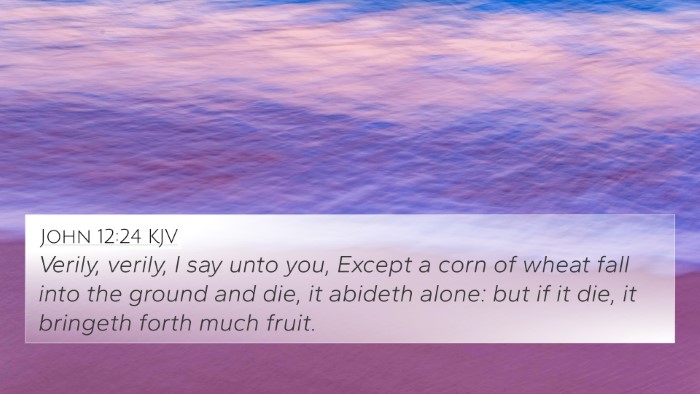
John 12:24 (KJV) »
Verily, verily, I say unto you, Except a corn of wheat fall into the ground and die, it abideth alone: but if it die, it bringeth forth much fruit.
Job 14:8 Verse Analysis and Similar Verses
Understanding Job 14:8
Job 14:8 states:
"Though its root may grow old in the earth, and its stump may die in the ground."
This verse reflects the profound themes of mortality and the fragility of life, as expressed by Job in his lamentation. Below, we explore the meaning of this verse, drawing insights from public domain commentaries such as those by Matthew Henry, Albert Barnes, and Adam Clarke.
Commentary Summary
Several commentators offer valuable insights into the meaning of Job 14:8:
-
Matthew Henry:
Henry emphasizes the decline and eventual death that is a natural part of life, comparing it to a tree whose vitality fades, symbolizing human life. He notes that even when all seems lost, there may be hope for renewal, akin to a tree that, despite being cut down, may sprout again.
-
Albert Barnes:
Barnes discusses the imagery of roots and stumps to illustrate the strength and persistence of life despite adversity. He suggests that this verse serves as a metaphor for the human condition, highlighting the inevitability of death and the fleeting nature of earthly existence.
-
Adam Clarke:
Clarke draws attention to the sorrow within the verse, marking it as a reflection of Job's despair. He elaborates that the decaying stump represents everything that has been lost in Job's life, yet also hints at the possibility that new life may emerge from despair.
Thematic Connections
The verse encapsulates themes that resonate throughout the Bible, especially concerning life, death, and renewal. These themes are interwoven with profound biblical truths that invite comparative analysis:
Bible Verse Cross-References
- Isaiah 6:13 - "But yet a tenth will be in it, and will return and be for consuming, as a terebinth tree or as an oak..."
- Psalms 1:3 - "He shall be like a tree planted by the rivers of water..."
- Ezekiel 17:24 - "And all the trees of the field shall know that I, the Lord, have brought down the high tree..."
- John 12:24 - "Unless a grain of wheat falls into the ground and dies, it remains alone; but if it dies, it produces much grain."
- Romans 5:12 - "Therefore, just as through one man sin entered the world, and death through sin..."
- Matthew 21:19 - "And seeing a fig tree by the road, He came to it and found nothing on it but leaves..."
- Hebrews 9:27 - "And as it is appointed for men to die once, but after this the judgment."
Linking Bible Scriptures
The connections between these verses illustrate the cyclical nature of hope and despair, death and rebirth. The imagery in Job 14:8 serves as a poignant reminder of life's transience, while simultaneously finding parallels in scriptures that suggest renewal and hope.
Tools for Bible Cross-Referencing
To further explore the connections between Bible verses, the following tools and methods can be beneficial:
- Bible Concordance: A useful guide to find occurrences of specific words and their related verses.
- Bible Cross-Reference Guide: Provides systematic references to verses supporting theological themes.
- Cross-Reference Bible Study: An approach that emphasizes understanding scripture through related texts.
Inter-Biblical Dialogue
Job 14:8 leads into a broader inter-Biblical dialogue, examining themes of suffering and restoration found in both the Old and New Testaments. Unlike purely academic interrogations, these discussions resonate deeply with everyday believers seeking meaning amidst life’s trials.
Practical Applications
For those grappling with questions about life and death, it may be valuable to meditate on the hope expressed through the cross-references. Job's lament can lead us to consider how we approach our own challenges and what these biblical insights say about God's promises of renewal.
Conclusion
Job 14:8 serves as a poignant reflection on human suffering and the potential for regeneration. By examining this verse through the lens of various commentaries and offering scriptural cross-references, believers are invited to explore deeper meanings and find hope in the midst of despair.
As you explore the scriptures, consider the interconnectedness of the biblical narrative and seek understanding through these tools for Bible cross-referencing.
